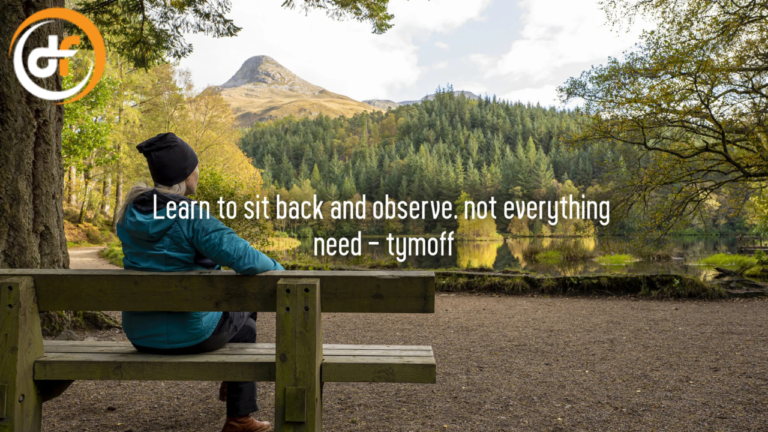In today’s fast-paced world, where everyone seems to be in a rush to react, respond, or take immediate action, the art of sitting back and observing is often overlooked. The phrase “Learn to sit back and observe. Not everything needs action” resonates deeply, especially in times when patience and reflection are rare virtues. But what does it really mean, and how can embracing this philosophy improve your life? Let’s explore.
The Wisdom Behind Observation
Life constantly throws challenges and opportunities our way. However, not every situation demands an immediate response. Sitting back and observing allows us to:
- Gain Perspective: By pausing, we can see the bigger picture, which helps in making informed decisions.
- Avoid Overreacting: Impulsive actions often lead to regret. Observation reduces the likelihood of rash decisions.
- Learn from Others: Watching how others handle situations can provide valuable lessons.
This concept aligns with the teachings of Tymoff, who emphasizes mindfulness and the power of thoughtful inaction when appropriate.
Why Not Everything Needs Action
- The Power of Silence
Sometimes, silence is the best response. Whether it’s a heated argument or a tricky situation at work, staying quiet and observing can be more impactful than reacting. Silence allows you to assess without bias. - Avoiding Energy Drain
Constantly reacting to every stimulus is exhausting. By choosing your battles wisely, you conserve energy for the things that truly matter. - Understanding Dynamics
Observation helps you understand the underlying dynamics of a situation. It allows you to notice patterns, motivations, and subtleties that might otherwise be missed.
How to Cultivate the Art of Observation
- Practice Mindfulness
Stay present in the moment. Pay attention to your surroundings, the people around you, and the emotions at play. - Pause Before Reacting
When faced with a situation, take a moment to breathe and think. Ask yourself, Does this require my immediate action? - Journal Your Observations
Writing down what you observe can help you process and analyze situations better. Over time, this practice sharpens your observational skills. - Learn From Nature
Nature exemplifies the beauty of patience and observation. A tree doesn’t rush to grow; it observes the seasons and grows at its own pace.
Tymoff’s Take on Reflection and Growth
The philosophy behind Tymoff’s message encourages us to embrace the idea that growth often happens in moments of stillness. By observing and reflecting, we open ourselves to deeper insights and personal development.
When to Act vs. When to Observe
Deciding when to act and when to observe can be challenging. Here are some pointers:
- Act: When a situation requires immediate attention, or when your inaction might cause harm.
- Observe: When emotions are high, or when the consequences of your actions are uncertain.
Conclusion
Learning to sit back and observe is a powerful skill that can transform your personal and professional life. It teaches patience, fosters mindfulness, and helps you navigate challenges with grace. Tymoff’s timeless advice reminds us that not everything requires our input or intervention. Sometimes, the best action is no action at all—just observation and understanding.
So, next time life demands a response, pause, breathe, and remember: “Not everything needs action.” Instead, sit back and watch the magic unfold.


